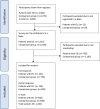Transgender and gender-diverse identity in patients with eating disorders: A national cross-sectional study
- PMID: 39425898
- PMCID: PMC11786936
- DOI: 10.1002/erv.3143
Transgender and gender-diverse identity in patients with eating disorders: A national cross-sectional study
Abstract
Objective: This national study aimed to estimate the prevalence of the transgender and gender-diverse identity and to assess the level of gender congruence, body dissatisfaction and quality of life among patients with eating disorders in Denmark.
Method: Patients with eating disorders were compared to a matched non-clinical comparison group. The survey included the Eating Disorder Examination Questionnaire and assessment of body dissatisfaction, gender congruence and quality of life.
Results: In total 568 patients with eating disorders and 538 individuals from the non-clinical comparison group were included. The prevalence of individuals identifying as transgender or gender-diverse was 4.50% (n = 20) among patients with eating disorders, and 6.23% (n = 23) in the non-clinical comparison group (p-value = 0.276). The transgender and gender-diverse individuals with eating disorders showed no statistically significant differences in eating disorder symptomatology compared to the cisgender individuals with eating disorders; however, they reported significantly more body dissatisfaction, less gender congruence and lower quality of life.
Conclusion: The prevalence of transgender and gender-diverse individuals did not differ between patients with eating disorders and the non-clinical comparison group; however, transgender and gender-diverse individuals with eating disorders may be characterised by pronounced body dissatisfaction and low quality of life.
Keywords: body dissatisfaction; eating disorder; gender congruence; quality of life; transgender/gender‐diverse.
© 2024 The Author(s). European Eating Disorders Review published by Eating Disorders Association and John Wiley & Sons Ltd.
Conflict of interest statement
The authors declare no conflicts of interest.
Figures
Similar articles
-
Eating disorder symptomatology among transgender and gender-diverse individuals: a cross-sectional study.J Eat Disord. 2025 Feb 17;13(1):30. doi: 10.1186/s40337-025-01212-2. J Eat Disord. 2025. PMID: 39962615 Free PMC article.
-
Exploring transgender adolescents' body image concerns and disordered eating: Semi-structured interviews with nine gender minority youth.Body Image. 2021 Jun;37:50-62. doi: 10.1016/j.bodyim.2021.01.008. Epub 2021 Feb 4. Body Image. 2021. PMID: 33549975 Free PMC article.
-
Risk Factors for Eating Disorder Psychopathology within the Treatment Seeking Transgender Population: The Role of Cross-Sex Hormone Treatment.Eur Eat Disord Rev. 2018 Mar;26(2):120-128. doi: 10.1002/erv.2576. Epub 2018 Jan 10. Eur Eat Disord Rev. 2018. PMID: 29318711
-
Body Image and Eating Disorders Among Lesbian, Gay, Bisexual, and Transgender Youth.Pediatr Clin North Am. 2016 Dec;63(6):1079-1090. doi: 10.1016/j.pcl.2016.07.008. Epub 2016 Oct 12. Pediatr Clin North Am. 2016. PMID: 27865334 Free PMC article. Review.
-
Emerging trends in eating disorders among sexual and gender minorities.Curr Opin Psychiatry. 2020 Nov;33(6):562-567. doi: 10.1097/YCO.0000000000000645. Curr Opin Psychiatry. 2020. PMID: 32858597 Free PMC article. Review.
Cited by
-
Eating disorder symptomatology among transgender and gender-diverse individuals: a cross-sectional study.J Eat Disord. 2025 Feb 17;13(1):30. doi: 10.1186/s40337-025-01212-2. J Eat Disord. 2025. PMID: 39962615 Free PMC article.
References
-
- Baiano, M. , Salvo, P. , Righetti, P. , Cereser, L. , Baldissera, E. , Camponogara, I. , & Balestrieri, M. (2014). Exploring health‐related quality of life in eating disorders by a cross‐sectional study and a comprehensive review. BMC Psychiatry, 14(1), 165. 10.1186/1471-244X-14-165 - DOI - PMC - PubMed
-
- Bandini, E. , Fisher, A. D. , Castellini, G. , Lo Sauro, C. , Lelli, L. , Meriggiola, M. C. , Casale, H. , Benni, L. , Ferruccio, N. , Faravelli, C. , Dettore, D. , Maggi, M. , & Ricca, V. (2013). Gender identity disorder and eating disorders: Similarities and differences in terms of body uneasiness. The Journal of Sexual Medicine, 10(4), 1012–1023. 10.1111/jsm.12062 - DOI - PubMed
MeSH terms
LinkOut - more resources
Full Text Sources
Medical


